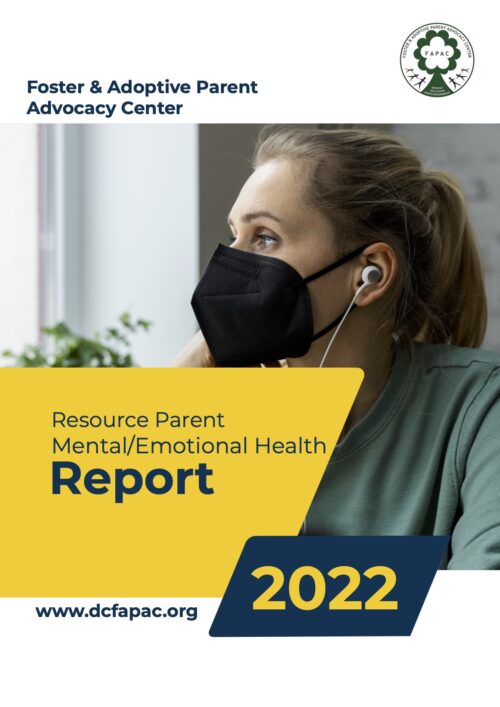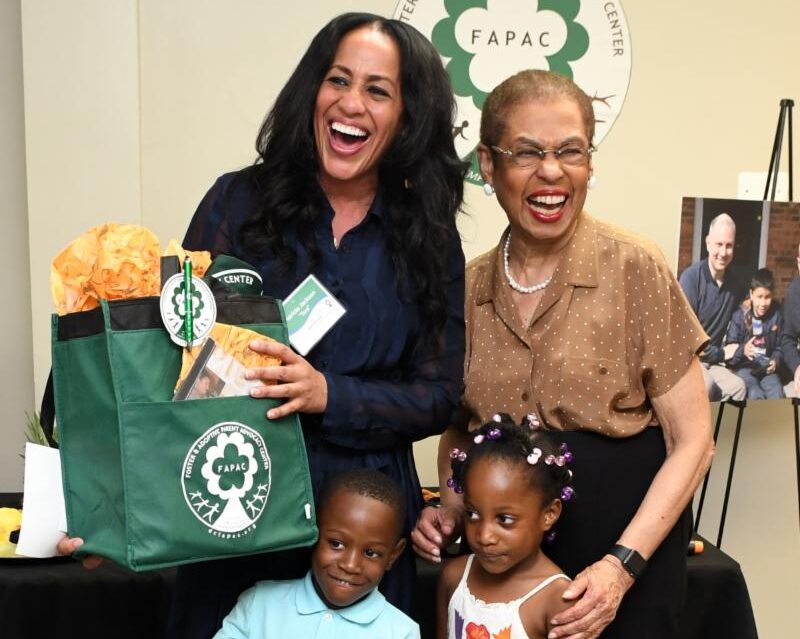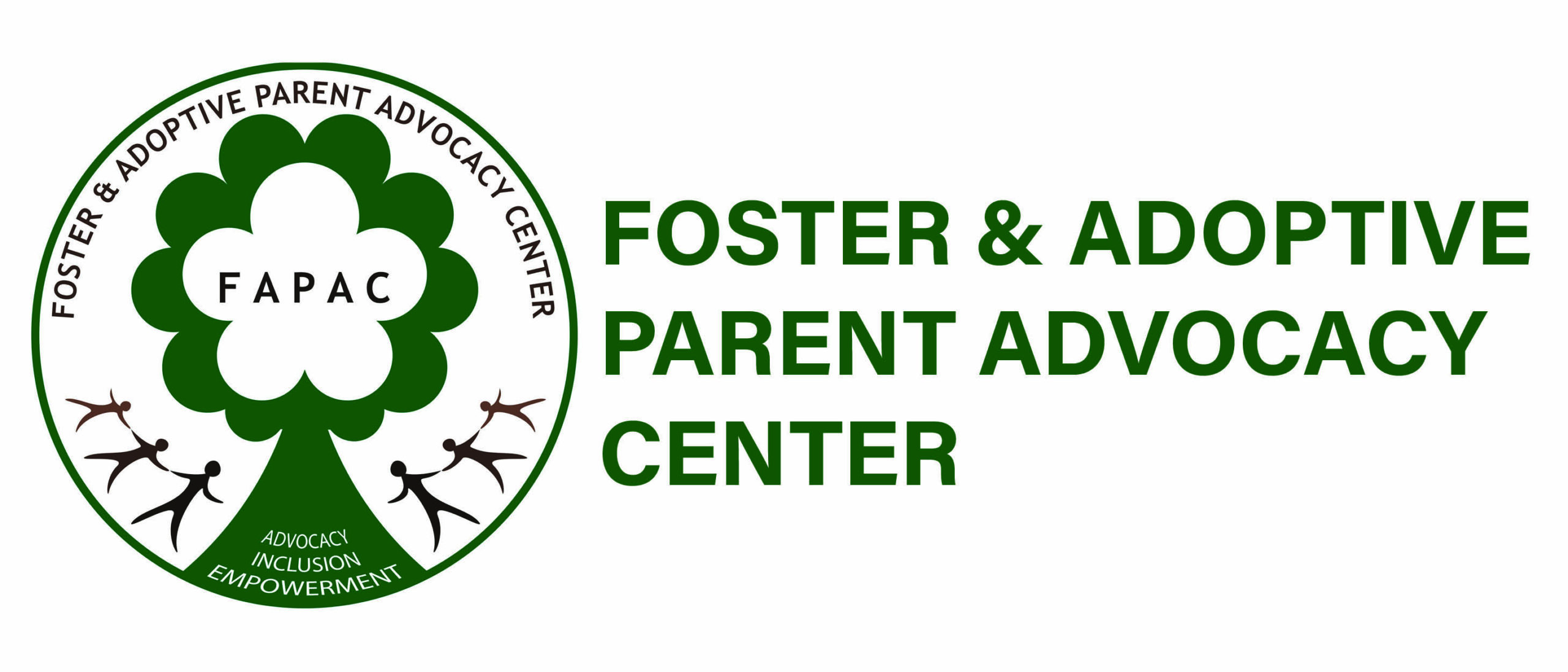We are thrilled to announce that FAPAC is partnering with the American Psychiatric Association Foundation.
National Foster Care Month aims to increase the visibility of children’s needs with their safety, well-being, and permanency. During May for National Foster Care Month, we acknowledge and appreciate foster and kinship parents, child welfare professionals, and other members of the fostering community for making a meaningful difference in the lives of children and youth.
Mental Health Awareness Month raises awareness of trauma and its impact on children, families, and communities’ physical, emotional, and mental well-being. Mental Health Awareness month also provides an opportunity to celebrate the tremendous strides made in social-emotional health.
The American Psychiatric Association Foundation (APAF) is the philanthropic and educational arm of the American Psychiatric Association. For 30 years, The APA Foundation has promoted awareness of mental illnesses and the effectiveness of treatment; the importance of early intervention, access to care; and the need for high-quality services and treatment through a combination of public and professional education, research, research training, grants, and awards.
APAF and FAPAC are working together to improve the foster care community’s mental health awareness and support. Stay tuned for more updates regarding our joint activities in the following months.

By: Kate Topping, LICSW
More than two years into the COVID-19 pandemic, our society is now acutely aware of the added stressors impacting our emotional health. We may have lost loved ones, we may still have fear and anxiety about getting sick, our social support systems may be lacking, our children may have educational setbacks, and/or we may face additional financial hardships.
FAPAC Survey Reveals Unmet Emotional Health Needs
When we add the child welfare system on top of those stressors, there is a good chance that the need for emeotional health supports will increase. The data from FAPAC’s 2022 emotional health survey for Foster Parents and Kinship Caregivers shows this as well: 59.5% of respondents reported that being a Foster or Kinship Caregiver affects their emotional health to some degree, while 67.6% of respondents noted that COVID-19 has affected their emotional health to some degree. Remarkably, given all of the stressors they are faced with, 84.7% of Foster and Kinship Caregiver respondents have not declined placements due to concerns about their emotional health.
Often, caregivers experience what is called vicarious (or secondhand) trauma, when they bear witness to the effects of trauma on the children in their care. This can be overwhelming and challenging and, when not addressed, could lead to caregiver burnout. It is imperative that our Foster Parents and Kinship Caregivers have their emotional health needs met, so that they may be fully able to guide and support the children in their care. Our survey indicated that 67.6% of respondents are unaware of any emotional health support services provided by CFSA or its partners. Yet, if free and confidential emotional health support services were available to our Foster and Kinship Caregivers, 81.1% of respondents stated they would utilize them.
New Emotional Health Resource List Compiled by the FAPAC Community
One way FAPAC is striving to help meet this need is by educating Foster and Kinship families about the emotional health supports that exist already. Thanks to our survey respondents, we have compiled a list of emotional health resources that Foster Parents and Kinship Caregivers have themselves found helpful. We have also added CFSA partners and a tool for finding therapists via Psychology Today.
Improving Services to Strengthen Foster and Kinship Families
Moving forward, FAPAC’s Advocacy Committee will continue to advocate for increased emotional health services – not only for Foster Parents and Kinship Caregivers, but for all those touched by the child welfare system. In February, Donna Flenory, longtime Resource Parent of teenagers and FAPAC Board Chair, testified before the DC City Council at the CFSA Oversight Hearing to bring attention to this need. We are committed to continuing our partnerships with CFSA and other stakeholders to ensure that families have the emotional health tools they need to successfully navigate the challenges they face, and effectively care for themselves and the children in their homes.

“As I look at those of you who are taking care of our children, I don’t have enough appreciation for Foster Care Appreciation Month. That’s just how wonderful and valuable you are.”
On May 31, Congresswoman Norton spent an evening with FAPAC families, bringing greetings and gratitude from Washington, D.C., and sharing the great need for foster families in the District. The program was part of Congresswoman Norton’s effort to celebrate National Foster Care Month, and also featured two thriving young adults – impacted by FAPAC – who shared powerful stories of the positive effect of their foster families.
Additional invitations to Congresswoman Norton will be extended in the future. We are thrilled that she took the time to support FAPAC and the work of foster families in the District!

The purpose of this study was to identify barriers to achieving permanency for children served by the District of Columbia child welfare system. The discussion about permanency in the District has been mostly based upon anecdotes and opinions; until this study there had been no actual study of the reasons why families hesitate to move forward with permanency. This study, implemented by the Foster and Adoptive Parent Advocacy Center (FAPAC) with funding from Kidsave, sought to gather information beyond the anecdotal through systematic administration of a standardized tool to assess barriers. We hope that DC Child and Family Services Agency and child welfare stakeholders will utilize the identification of specific barriers to provide resources, develop policies and procedures, and initiate interventions to remediate these barriers to permanency for children in CFSA custody.
Some of the most relevant findings were unintended and discovered when reviewing cases for our original sample as identified by the CFSA data management system. At that time, we determined that the number of children with a goal of adoption or guardianship who were in foster care placements of at least two years were in actuality fewer than anticipated based upon agency folklore and anecdote. Findings from analysis of the barriers identified by interviewed foster and kinship parents and social workers include:
- Overall, foster/kinship parents were more likely than social workers to identify service needs as barriers to finalization. Social workers identified either none or a low rate of barriers in a number of service areas. Only one-half (50%) of foster/kinship parents indicated that they were working with their social workers to address these specific barriers.
- The barriers that families gave for not moving to permanency are felt to be barriers that should be able to be negotiated within a few weeks if there was a clear practice model that supported identifying and working to eliminate barriers (i.e., day care, respite, school, tutoring, education, mentoring, subsidy, mental health, health care, college, after school care.) The prevalence of these issues as barriers leads to the question of how much effort is made t validate and to resolve barriers.
- An unexpected finding was the number of foster/kinship parents who referenced difficulties in their relationship with their child welfare agencies (both public and private) as a major barrier to permanency.
- Termination of Parental Right (TPR) was mentioned as a significant barrier by bother foster parents and social workers, however more research would be needed to understand exactly in which ways TPR was considered to be an issue.
- Bother foster parents and social workers made frequent mention of the child’s concerns about adoption as a barrier to achieving permanency.



